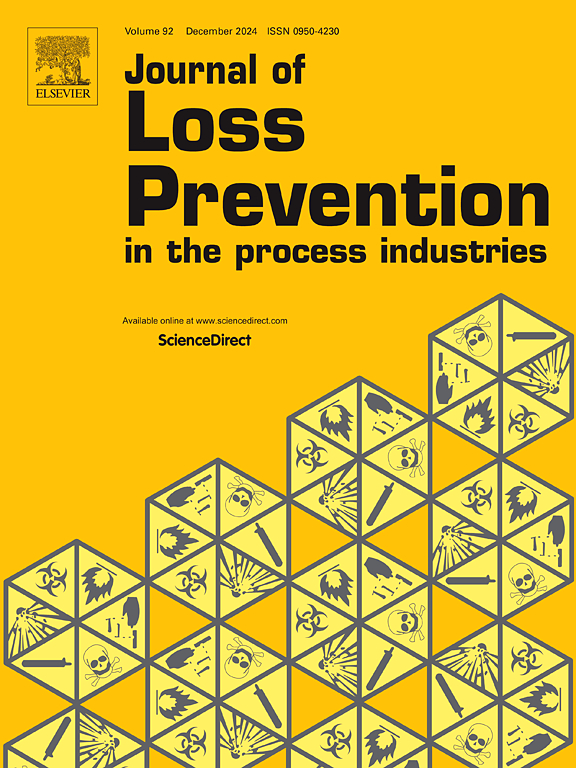Study the impact of spacer at thermal degradation process of MLI-based insulation in fire condition
IF 3.6
3区 工程技术
Q2 ENGINEERING, CHEMICAL
Journal of Loss Prevention in The Process Industries
Pub Date : 2024-10-12
DOI:10.1016/j.jlp.2024.105461
引用次数: 0
Abstract
To reduce CO2 emissions, energy carriers such as hydrogen are considered to be a solution. Consumption of hydrogen as a fuel meets several limitations such as its low volumetric energy density in gas phase. To tackle this problem, storage as well as transportation in liquified phase is recommended. To be able to handle this component in liquid phase, an efficient thermal insulation e.g., MLI insulation is required. Different studies have been addressed the vulnerability of such insulation against high thermal loads e.g., in an accident engaging fire. Some of research works have highlighted the importance of considering the MLI thermal degradation focusing on its reflective layer. However, limited number of studies addressed the thermal degradation of spacer material and its effect on the overall heat flux.
In this study, through systematic experimental measurements, the effect of thermal loads on glass fleece, glass paper as well as polyester spacers are investigated. The results are reported in various temperature and heat flux profiles. Interpreting the temperature profiles revealed that, as the number of spacers in the medium increases, the peak temperature detectable by the temperature sensor on the measurement plate decreases. Each individual spacer contributes to mitigating the radiative energy received by the measurement plate. Stacks of 20–50 spacers (this is the number of layers in commercial MLI systems applied for liquid hydrogen applications) can potentially reduce the thermal radiation by 1–2 orders of magnitude.
An empirical correlation to predict a heat flux attenuation factor is proposed, which is useful for further numerical and analytical studies in the temperature range from ambient to 300 °C.
研究间隔物在火灾条件下对基于 MLI 的隔热材料热降解过程的影响
为了减少二氧化碳排放,氢气等能源载体被认为是一种解决方案。使用氢作为燃料会遇到一些限制,例如在气相中氢气的体积能量密度较低。为解决这一问题,建议以液化状态储存和运输氢气。为了能够处理液相中的这种成分,需要一种高效的隔热材料,如 MLI 隔热材料。不同的研究都探讨了这种隔热材料在高热负荷(如火灾事故)下的脆弱性。一些研究强调了考虑多层绝缘热降解的重要性,重点是其反射层。在本研究中,通过系统的实验测量,研究了热负荷对玻璃纤维毡、玻璃纤维纸以及聚酯垫片的影响。实验结果显示了不同的温度和热通量曲线。对温度曲线的解读表明,随着介质中间隔条数量的增加,测量板上温度传感器检测到的峰值温度也会降低。每个隔板都有助于减少测量板接收到的辐射能量。20-50 个间隔物的堆叠(这是应用于液氢的商用 MLI 系统的层数)有可能将热辐射减少 1-2 个数量级。
本文章由计算机程序翻译,如有差异,请以英文原文为准。
求助全文
约1分钟内获得全文
求助全文
来源期刊
CiteScore
7.20
自引率
14.30%
发文量
226
审稿时长
52 days
期刊介绍:
The broad scope of the journal is process safety. Process safety is defined as the prevention and mitigation of process-related injuries and damage arising from process incidents involving fire, explosion and toxic release. Such undesired events occur in the process industries during the use, storage, manufacture, handling, and transportation of highly hazardous chemicals.

 求助内容:
求助内容: 应助结果提醒方式:
应助结果提醒方式:


